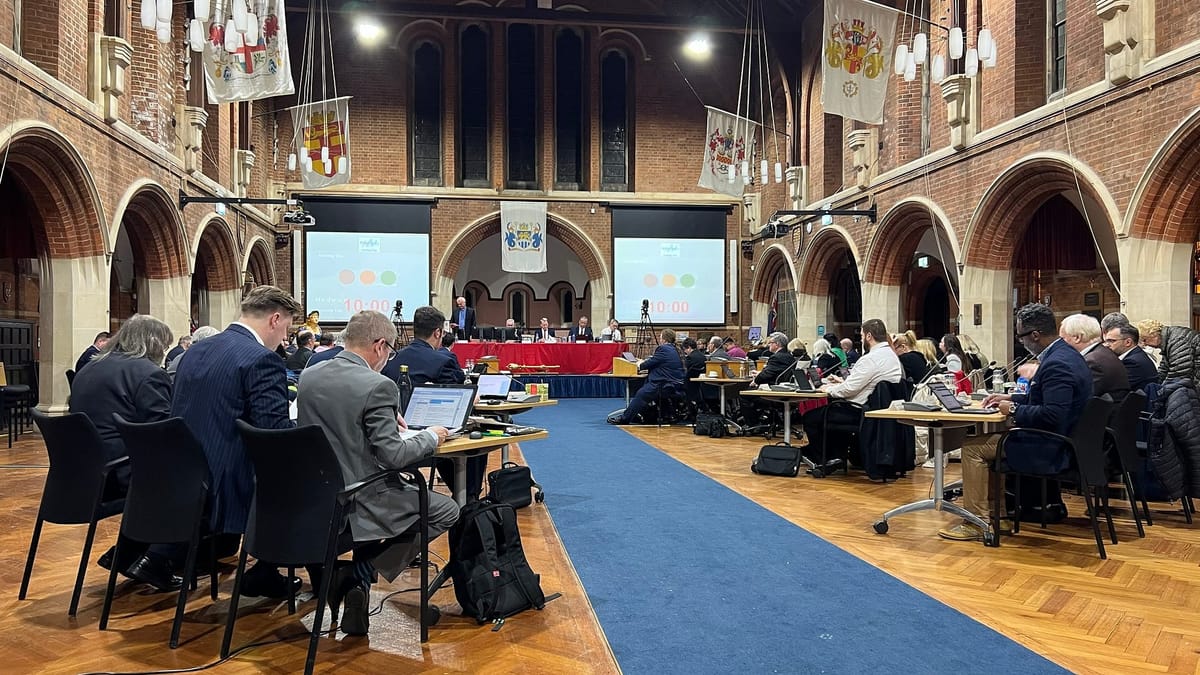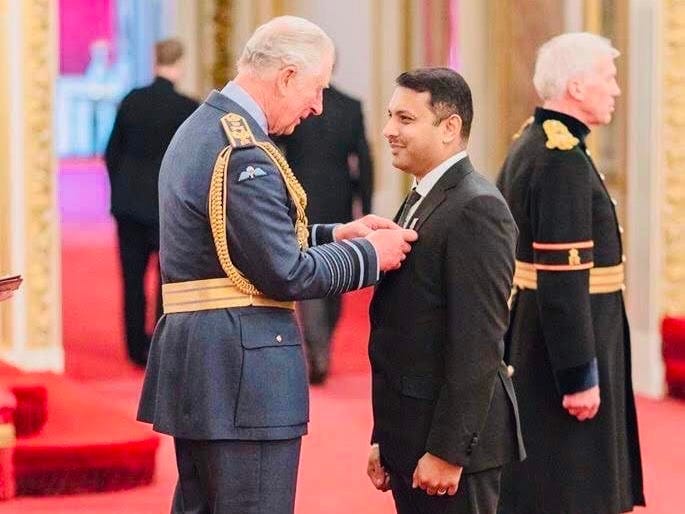Medway shrinks its democracy
Plus 4D to the future, Medway to build a care home, Spalding censured, news in brief, and more

A slightly different edition this week, with all of our main stories centred on last week’s full council meeting. It was a lively night that reshaped Medway’s democratic rules, set out the area’s preferred unitary map of the future, approved a £44m care home, and delivered the council’s first ever formal censure. Further down, we’ve also got news in brief, and more. To the news!
Medway shrinks its democracy
The first sign of how the night would go arrived before the meeting even started. The press desks had been quietly moved again, a repeat of last month’s attempt to tuck journalists in the corner so they couldn’t see what Labour backbenchers were up to on their laptops.
It set the tone for what came later.

Medway Council has pushed through a set of constitutional changes that will sharply reduce the ability of smaller political groups to submit motions at future meetings. The Labour administration, backed by the Conservative group, voted for a system that restricts guaranteed motion slots to political groups holding at least 10% of council seats. In Medway, that threshold is six councillors. The Independent Group has five. Reform has three. Under the new rules, neither will have an automatic right to submit a motion at any full council meeting for an entire year.
Instead, they will have to hope their motions win a place through a ballot system. Two ‘unallocated’ motion slots will be awarded this way each municipal cycle. It is possible that the smaller groups could get one. It is just as possible they could get none. The previous system gave every group one guaranteed motion per meeting. That is now gone.
Labour insists the changes are about efficiency. They point to the length of recent meetings, many of which have run past midnight, sometimes after multiple hours spent debating motions alone. Their argument is that councillors and officers, many of whom work full-time, shouldn’t be stuck in the chamber until one in the morning, and that reducing the number of motions will help.
But that argument doesn’t explain why Labour and the Conservatives chose this system when other options existed. The cross-party governance meetings discussed a range of models, including an ‘Equity’ plan that would have guaranteed at least one annual motion for the Independent Group, reflecting the principle that every councillor represents a constituency, regardless of party size. They also considered maintaining the current equality system or setting annual caps without excluding anyone. Labour and the Conservatives rejected all of them.
What they backed instead was ‘Equity & 10%,’ which reserves guaranteed slots for the two largest groups and excludes everyone else by design. The report makes this explicit. The threshold aligns with rules for political assistants and group allowances. In practice, it means a group representing nearly 10% of the chamber loses 100% of guaranteed motion rights because it falls short by a single councillor.
The changes go further. Motions will now be restricted to ‘specific local authority functions.’ Historically, Medway has allowed motions on broader social, economic, and environmental issues that affect the area. That flexibility will now be interpreted narrowly, and officers will be empowered to reject motions that have only a ‘passing or tenuous’ link to council responsibilities.
These details weren’t widely discussed in the chamber. Instead, the debate became dominated by accusations of silencing. Cllr Michael Pearce of the Independent Group called the changes “an abuse of power” by the Labour administration and accused the Conservative Group, whom he referred to as the “so-called opposition,” of helping push them through. He noted that the Independent Group had previously used motions to bring forward issues the administration did not want debated, including last year’s motion to save jobs at Chatham Docks. Under the new rules, a motion like that may not get near the agenda again.
Cllr Elizabeth Turpin warned that the new system risked ushering in “officer-led censorship.” Cllr Teresa Murray told her to apologise for implying officers were part of a conspiracy. The mood in the room deteriorated from there. Labour councillors could be seen laughing and making exaggerated boohoo gestures at members of the smaller groups as they raised concerns about being shut out of the democratic process. It was not an edifying sight.
Reform were no less furious. After the vote, Cllr Robbie Lammas posted that Labour and the Conservatives had “rigged the rules” to silence them, and announced the group would seek confirmation from a specialist barrister as they prepare a legal challenge. This follows what Reform says is independent legal advice suggesting parts of the change may be unlawful.
Labour’s defence was that meetings need to be shorter and that councillors have other ways to raise issues, like expanded questions at Cabinet meetings. But questions and motions are not the same thing. A question gets a written or verbal response and moves on. A motion forces a debate, takes a position, and allows councillors to build consensus or divide the chamber. Removing guaranteed motions from one sixth of councillors may shorten meetings, but it also narrows democratic space.
In the end, Labour and the Conservatives voted together to approve the new rules. The Independent Group, Reform, and independent councillor Chris Spalding voted against. The changes passed 42–9.
Medway backs a 4D map
Medway Council has formally backed the ‘4D’ model for reorganising local government across Kent, voting in favour of a four-unitary structure that would see Medway merged with most of Gravesham, Dartford, and part of Swale. The decision now moves to Cabinet, which is meeting tonight (Tue 18 Nov) to sign it off. This will be a formality. The administration has been clear for weeks that 4D is its preferred map.
Medway Council’s Labour leader Vince Maple acknowledged that the meeting wasn’t technically required. The decision sits with Cabinet. Full council was held anyway, he said, because it was “the right thing to do” and because councillors deserved a public debate on the options. That debate quickly became one of the liveliest the council has seen this year.
The Conservatives tabled an amendment calling for the ‘3A’ model, a three-unitary Kent, and made it clear they saw this as the only serious option on the table. Leader of the opposition George Perfect described it as “the only viable option” for delivering efficient, accountable government, arguing that it offers the highest savings, the lowest implementation cost, and the fastest payback period. His group lined up behind him. Cllr Barry Kemp called Labour’s model a “wrecking ball”. Cllr Gary Hackwell emphasised the savings gap, £128m versus £136m, in a tone that suggested £8m was a vast difference even at this sort of scale.
Perfect attacked Labour’s option as “chaotic,” “unbalanced”, and drawn up “without engagement.” He also accused the 4D work of costing taxpayers at least £105,000, a figure he described as a “vanity project” for Maple. His group’s message was clear that 3A is balanced, collaborative, and aligned with senior Conservative figures across the county.
Labour, of course, disagreed. Maple argued that 4D was the only model that matched the government’s original brief, with roughly half a million residents per unitary, and said his plan fixed some of the more odd boundaries wherever possible, using “hard borders like motorways” when possible.
The debate wasn’t confined to the main parties. Reform tabled their own amendment calling for a ‘status quo’ option, despite the party’s KCC colleagues arguing vocally for a single unitary covering all of Kent. Leader David Finch said that “doing nothing isn’t doing nothing,” but the chamber was unimpressed. Conservatives, Labour, and several independents took turns criticising the proposal. Cllr Adrian Gulvin called the situation at KCC “a farce” and described the Reform administration at County Hall as a “bunch of fools.”
The Independent Group managed to both support and oppose the status quo within ten minutes. Cllr Pearce said nothing would give him greater pleasure than scrapping the Medway unitary, but rejected the costs involved in any of the reorganisation plans and backed Reform’s amendment. Group leader Cllr Crozer then rose moments later to talk about the “opportunities” of larger unitaries, the same ones his colleagues voted against.
On the vote, Labour’s 4D model passed 30–21, with Labour and part of the Independent Group backing it, and Conservatives and Reform opposing.
Following the debate, Labour leader Vince Maple told Local Authority that 4D was the only model that matched the government’s original brief. “We’ve worked within the brief,” he said. “We’ve kept most existing boundaries and used hard borders like motorways where we needed to.”
He also hinted that Medway wouldn’t be alone. “I’ve had conversations with colleagues across Kent,” he said. “I don’t think we’ll be the only council supporting 4D.” He also dismissed the KCC single-unitary proposal: “The issues around a one-county model are pretty substantial. It doesn’t even allow us to pursue a mayoral combined authority.”
Tonight’s Cabinet meeting will confirm Medway’s submission. The real decisions that decide what Kent looks like in a few years’ time will be made in Whitehall.
A new care home for Medway
Medway Council voted to build a £44m 80-bed care facility on the former Innovation Park Medway site, the first time the authority has taken on a project of this scale itself. The administration says the new home will help tackle the persistent issue of people stuck in hospital beds because no suitable care placement is available locally.
Cllr Teresa Murray said the home would be “big and beautiful”, an unexpectedly Trumpian flourish for a meeting already full of unexpected lines. Conservative councillors said the principle was sound but questioned the mix of residential and respite beds, arguing the entire facility should be focused on residential care. They also noted that, because the home is unlikely to open before any new unitary structure is created, its beds will serve a wider area than just Medway.
Reform opposed the plan. The Independent Group supported it, with Cllr Spalding giving the most personal contribution of the night as he described his father being stuck in hospital due to a lack of care beds. When it came to the vote, the scheme passed 34–17.
Spalding censured by the council
Independent councillor Chris Spalding has been formally censured after Medway Council’s conduct committee found he bullied and harassed a member of the public during a long-running dispute over a nursery in Allhallows. The committee instructed him to issue a written apology and undertake further training. He has refused to do either.
Presenting the report, Cllr Dan McDonald said the code of conduct exists “to respect the integrity of this council” and noted that censure is the strongest sanction available. Cllr Barry Kemp supported the move, saying the council had already spent “too many hours” on the case, and challenged Spalding to justify his supposed legal credentials.
Spalding rejected the findings and said he would be launching High Court action for defamation against the nursery owner. This marks the first time Medway Council has issued a formal censure, with councillors agreeing on the sanction.
In brief
🍝 A planning application has been submitted to convert the former Lloyds bank building in Strood into a restaurant.
🛒 Home Bargains has opened at Hempstead Valley. Future Medway have the pictures from inside. Spoiler alert: It looks like a Home Bargains.
🎸 McFly will play Rochester Castle Live next year. Tickets will only set you back £61.60.
🏠 The wonky building on Rochester High Street is up for sale for £500,000.
🏚️ Look, we all know Chatham High Street is a bit rough, but this Daily Express piece paints it as some post-apocalyptic hellscape.
More Authority
Dr Shibu Chacko received an MBE for his services to improving organ donations within the Black Asian and Ethnic Minority communities. Steven sat down with him to discuss what brought him to Medway, how he came to work in organ donation, the Glendale Academy, and lots more.

Footnotes
Have a Medway story you think we might be interested in? Get in touch via hello(at)localauthority(dot)news - We’re always happy to talk off the record in the first instance…
Follow us on social media! We’re on Facebook, Instagram, BlueSky, and Threads, but not that other one.
If you enjoy Local Authority, please share it with your friends, family, associates, and even your enemies. We have no meaningful marketing budget, so we rely on word of mouth from our readers to find new readers. You can even get some sweet, sweet rewards for sending new readers our way. Details here.






